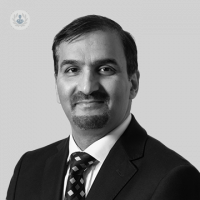Carotid arteries what are warning signs narrowed neck artery
Escrito por:Carotid arteries are blood vessels found in your neck that supply the head, brain and face with oxygen-rich blood from the heart. You can even feel them by placing your fingers gently either side of your windpipe at the front of the neck.
These arteries also provide essential oxygenated blood to the front parts of the brain which control our ability to move our body, feel things and speak. For some people, there is a risk of these arteries becoming clogged up and causing carotid artery disease, which can lead to very serious problems. Mr S. Tawqeer Rashid, a respected consultant vascular surgeon from Manchester, explains the warning signs of this condition.

What causes carotid artery disease?
Your arteries are designed to carry blood away from the heart to the rest of the body. They are hollow tubes with a smooth inside surface that allows the blood to easily travel through. Over time, fatty deposits - known as plaque - can build up on the inside of the artery. This process is known as atherosclerosis.
Gradually, over many years, these deposits can grow and cause the available space inside the artery, known as the lumen, to narrow. This is often called 'furring up of your arteries', though health care professionals call this occlusive disease.
Although everyone is affected to some extent, especially as you age, several influences can increase the risk of arteries furring up, such as:
It is also true that if you have the disease in one area of the body you are more likely to have it in another, so people with the disease in their leg or heart arteries often have it in their carotid artery.
Are there any early warning signs or symptoms?
Narrowing and blockages of the blood vessels that supply the brain can cause a stroke or a mini-stroke known as a transient ischaemic attack (TIA).
In TIAs, the blockage is temporary and quickly clears itself. The symptoms are similar to a stroke but they get better very quickly. Symptoms may include:
- Weakness, numbness or pins and needles in the face, arm or leg
- Slurring of speech or difficulty in finding words
- Loss of vision in one eye
These attacks may last for a few minutes or hours and are usually better within a day. In comparison, a full stroke lasts for more than one day and you don’t always fully recover.
How is carotid artery disease treated?
Firstly, any conditions which increase your risk of narrowing the artery need to be addressed.
If you smoke you should stop completely, and a healthy diet can help with high blood pressure, high cholesterol or high sugar levels in the blood.
Your doctor will probably recommend medicines to improve the control of high blood pressure, high cholesterol or high sugar levels.
Drugs may also be prescribed to thin the blood and make it less sticky. This reduces the chance of a clot forming around the plaque which can block the blood supply to a part of the brain.
If investigations, like an ultrasound scan, suggest that the carotid arteries in the neck are narrowed beyond 50%, then this narrowing can be treated to reduce the risk of future strokes. There are two main ways of doing this:
- An operation to remove the diseased plaque, which is known as carotid endarterectomy.
- A keyhole technique called stenting in which a small, wire-mesh tube is inserted into the artery where the diseased plaque is. Then with the aid of a special balloon, the narrowed segment is widened and held open by the stent.
What's the long-term outlook?
It partly depends on how narrow the artery is and if you have had any previous problems in the form of a TIA or stroke.
If you have never had any problems, but your artery is narrowed by over 70%, then your risk of a stroke is around 2.5% per year.
If, on the other hand, you have had a recent TIA or stroke with a significantly narrowed artery then your risk of having another - and potentially more serious - stroke could be as high as 10% within the next week. That’s why doctors regard a stroke or a TIA as a medical emergency and you must report to the hospital straight away.
If you are worried about any of the symptoms mentioned in this article, you can talk to Mr S. Tawqeer Rashid by going to his Top Doctors profile and booking an e-Consultation.


